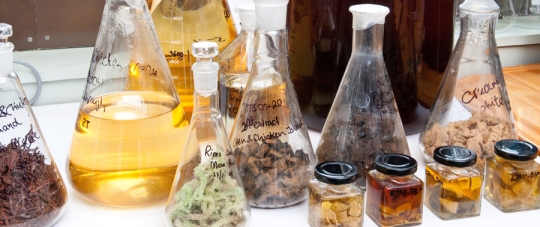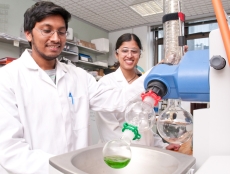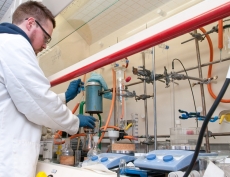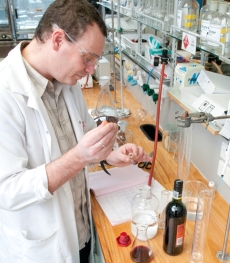Natural products chemistry
This research group, led by Robert Keyzers, studies metabolites and isolates and characterises novel bioactive compounds from the Pacific region.
We study metabolites from a variety of matrices, and isolate and characterise novel bioactive compounds from organisms sourced in New Zealand and the Pacific region.

Bioactives

Isolating bioactive molecules from mixtures can be done in two different ways. The mixture can either be separated on the basis of its behaviour in a biological assay (activity-guided), or by isolating molecules from the mixture that have interesting chemical structures (structure-guided). The aim of both is the same—to find new pharmaceutical leads.
We begin with anti-fungal, anti-inflammatory or anti-bacterial assays for our activity-guided isolation, as well as a number of purification techniques to isolate the compounds of interest. We also utilise various spectroscopic techniques (NMR, MS) to screen extracts of organisms and to guide the isolation of natural products as a complement to the bioassay-guided approach.
Structural identification of the active components follows, using mass spectrometry and nuclear magnetic resonance (NMR) spectroscopy. Our premise is that chemical novelty equates to bioactive novelty as irrelevant metabolites are bred out through natural selection.

Finally, we sometimes attempt the synthesis of target molecules we have isolated. Analogues are also synthesised to help identify potential structure-activity relationships that may prove useful for the development of new pharmaceuticals, to confirm the chemical structure we have determined for the compound and to provide a reliable supply of the compound for testing.
Secondary metabolites

Secondary metabolites are a broad class of compounds that have an important role in biological activities, as well as for sessile marine invertebrates and algae. Primary metabolites are common to all organisms and are necessary for life, but secondary metabolites are specific to the producing species and are non-essential, although they do bring some ecological advantage to the producer.
We are working on the metabolic profile of various products. Current projects involve identifying links between the secondary metabolites to find natural resources to fight plant pathogens (including Kauri dieback), and to probe symbiotic organisms to find new chemistry.
Read about our NMR spectrometers.
Academic staff
Head of School
School of Chemical and Physical Sciences

